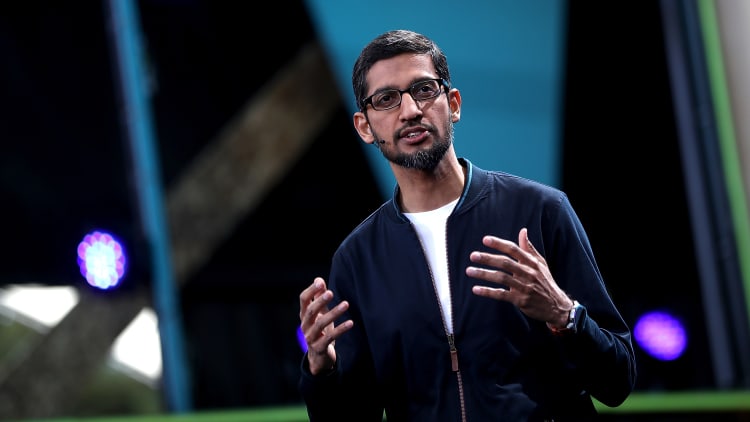
Alphabet stock initially dropped as much as 5 percent after it reported disappointing Q4 earnings, though it bounced back during the company's earnings call to settle around 2 percent down. The company posted strong revenue growth, but investors are still leery of rising costs and reduced margins.
Alphabet missed Wall Street expectations on the bottom line, but beat estimates on revenue:
- Earnings per share: $9.70 vs $9.98 expected by a Thomson Reuters consensus estimate
- Revenue: $32.32 billion vs $31.86 billion expected by a Thomson Reuters consensus estimate
As usual, it was Google's swelling ads business, which posted $27.27 billion in revenue in Q4, that drove Alphabet's growth. Google's "other revenues" category, which includes its burgeoning enterprise business, hardware sales, and app store, posted $4.69 billion in revenue, bringing total Google revenue to $31.91 billion.
For the first time, Google CEO Sundar Pichai provided color on the company's cloud unit, noting on the earnings call that it has become a "billion dollar per quarter business." While you can't make direct comparisons between Google, Amazon, and Microsoft's cloud businesses, Google is behind both, though Pichai said that Google Cloud Platform was "the fastest growing major public cloud provider" in 2017 based on publicly reported data.
Overall, Alphabet's 2017 revenues were up 23 percent year-over-year, hitting $110.9 billion.
Meanwhile, Google's ads were getting clicked more than Wall Street expected year-over-year, and its cost per click, or how much advertisers pay, decreased slightly less that what analysts expected.
- Aggregate paid clicks: 43 percent increase year-over-year vs increase of 42.1 percent expected by StreetAccount estimates
- CPC: 14 percent year-over-year decline vs decline of 14.6 percent expected by StreetAccount estimates
CPC has been declining for years, a trend that Alphabet has attributed to the shift to mobile and the increase in importance of YouTube ads, which have gotten lower rates than desktop ads.
Porat also noted in the earnings call that Google's traffic acquisition costs as a percentage of revenue would continue to rise, but that the pace would slow later this year. Google's total TAC, which includes the money it pays to phone manufacturers, like Apple, that use its services, like search, hit $6.45 billion, or 24 percent of Google's advertising revenues. That's up 33 percent year-over-year and investors worry about how continued rise could squeeze Google's margins.
Another point of worry for investors was how a handful of big-name companies pulled their advertisements from YouTube in the wake of several reports of disturbing content on the video platform. YouTube promised late last year to hire thousands of new content moderators, and Porat said that advertiser response has been positive.
"Overall on Youtube, we're doing a lot to protect the ecosystem," Porat told CNBC in an interview. "The overwhelming majority of advertisers never left and those who did, many are already back on the platform."
While Google's advertising business still pumps out the profits, Alphabet also breaks out the revenues and losses for its "Other Bets," like smart-home hardware maker Nest and healthcare company Verily. Other Bets posted Q4 revenue of $409 million on operating losses of $916 million. On the company's earnings call, Porat attributed the revenue growth to Nest, Verily, and its Google Fiber internet business.
Alphabet also announced that John Hennessy will be the company's new chairman. He's been a board member since 2004 and takes the seat from Eric Schmidt, who announced that he was stepping down in December.
Finally, the company noted that the recently passed tax reform resulted in a one-time expense of $9.9 billion in the fourth quarter and that it planned to extend its share repurchase program up to an additional $8.6 billion of Class C stock.


